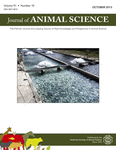-
Views
-
Cite
Cite
J. Jeong, J. Bong, G. D. Kim, S. T. Joo, H.-J. Lee, M. Baik, Transcriptome changes favoring intramuscular fat deposition in the longissimus muscle following castration of bulls, Journal of Animal Science, Volume 91, Issue 10, October 2013, Pages 4692–4704, https://doi.org/10.2527/jas.2012-6089
Close - Share Icon Share
Abstract
Castration increases intramuscular fat (IMF) deposition, improving beef quality in cattle. The present study was performed to determine the global transcriptome changes following castration of bulls and to identify genes associated with IMF deposition in the longissimus dorsi (LM) of Korean cattle. A customized bovine CombiMatrix oligonucleotide microarray was constructed, and transcriptome changes following castration were determined by microarray hybridization. Transcriptome comparison between bulls and steers indicated that 428 of 8,407 genes were differentially expressed in the LM by greater than two fold (P < 0.05). Gene expression profiling indicated alterations in several pathways, including adipogenesis, fatty acid oxidation, tricarboxylic acid (TCA) cycle, and oxidative phosphorylation (OP), following castration. Castration upregulated transcription of adipogenic perilipin 2 (PLIN2) and visfatin, lipogenic fatty acid synthase, fatty acid esterification 1-acylglycerol-3-phosphate O-acyltransferase 5, and many fatty acid oxidation–related genes. Many TCA cycle and OP genes were also transcriptionally upregulated. Correlation analysis indicated that the IMF content in the LM was highly correlated with mRNA levels of PLIN2 (r = 0.70, P < 0.001), adenosine triphosphatase (ATPase), H+-transporting, lysosomal 42 kDa, V1 subunit C1 (ATP6V1C1: r = 0.66, P < 0.001), and cytochrome c oxidase assembly homolog 11 (COX11: r = 0.72, P < 0.001) genes in a pooled animal group of steers plus bulls, and significant correlations in the steer-alone group were maintained in the 3 genes, PLIN2 (r = 0.47, P < 0.05), ATP6V1C1 (r = 0.50, P < 0.05), and COX11 (r = 0.60, P < 0.01). In conclusion, our study provided evidence that castration shifts transcription of lipid metabolism genes, favoring IMF deposition by increasing adipogenesis, lipogenesis, and triglyceride synthesis. This study also indicated that castration increases transcription of genes involved in fatty acid oxidation and subsequent energy production (TCA and OP genes). Our microarray analysis provided novel information that castration alters the transcriptome associated with lipid/energy metabolism, favoring IMF deposition in the LM.





